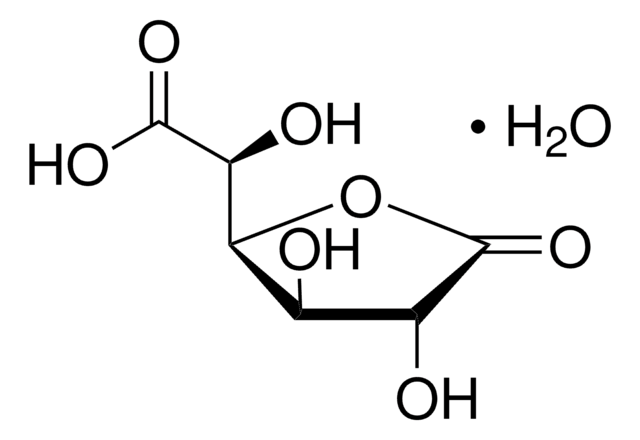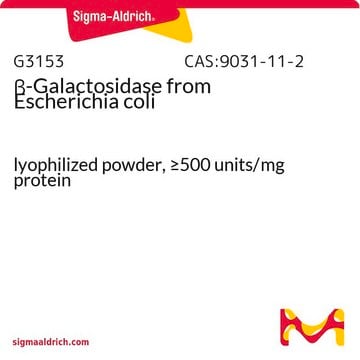Összes fotó(1)
Fontos dokumentumok
I6034
α-L-Iduronidase human
recombinant, expressed in mouse NSO cells
Szinonimák:
IDUA
Bejelentkezésa Szervezeti és Szerződéses árazás megtekintéséhez
Összes fotó(1)
About This Item
Javasolt termékek
rekombináns
expressed in mouse NSO cells
Minőségi szint
Forma
solution
specifikus aktivitás
≥7,500 units/μg protein
molekulatömeg
83 kDa
szennyeződések
≤1.0 EU/μg Endotoxin
kiszállítva
wet ice
tárolási hőmérséklet
−20°C
Általános leírás
α-L-Iduronidase (IDUA) is mapped to human chromosome 4p16.3. The mature IDUA protein is glycosylated and comprises triosephosphate isomerase (TIM) barrel domain, β-sandwich, helix-loop-helix region and an immunoglobin-like domain. α-L-Iduronidase is classified under glycoside hydrolase (GH) family 39.
Alkalmazás
α-L-Iduronidase may be used for leukocyte assay in the study of a-L-Iduronidase deficiency in new born.
Biokémiai/fiziológiai hatások
In lysosomal degradation process α-L-Iduronidase plays a crucial role. It hydrolyzes the non-reducing terminal α-L-iduronic acid residues in glycosaminoglycans (GAGs), including dermatan sulfate and heparan sulfate.
Mutation in the α-L-Iduronidase is implicated in Mucopolysaccharidosis I (MPS I) . This enzyme defect leades to accumulation of dermatan and heparan sulfate . MPS I pathophysiology is accompanied with deformation of the skull, mental retardation and hernias.
Catalyzes the hydrolysis of unsulfated α-L-iduronosidic linkages in dermatan sulfate
Fizikai tulajdonságok
Expressed as C-terminal histine-tagged protein (residues 1-653) with a caluclated molecular mass of 71 kDa migrating at ~83 kDa under SDS-PAGE reducing conditions.
Egység definíció
One unit will produce 1 picomole of 4-methylumbelliferone from 4-methylumbelliferyl-α-L-iduronide per minute at pH 3.5 at 25 °C.
Fizikai forma
Supplied as a solution in 40 mM sodium acetate , 400 mM NaCl and 20% (v/v) glycerol, pH 5.0
Tárolási osztály kódja
10 - Combustible liquids
WGK
WGK 1
Lobbanási pont (F)
Not applicable
Lobbanási pont (C)
Not applicable
Válasszon a legfrissebb verziók közül:
Analitikai tanúsítványok (COA)
Lot/Batch Number
Nem találja a megfelelő verziót?
Ha egy adott verzióra van szüksége, a tétel- vagy cikkszám alapján rákereshet egy adott tanúsítványra.
Már rendelkezik ezzel a termékkel?
Az Ön által nemrégiben megvásárolt termékekre vonatkozó dokumentumokat a Dokumentumtárban találja.
Az ügyfelek ezeket is megtekintették
Mei Dai et al.
Proceedings of the National Academy of Sciences of the United States of America, 111(7), 2680-2685 (2014-02-20)
Use of megakaryocytes/platelets for transgene expression may take advantage of their rapid turnover and protective storage in platelets and reduce the risk of activating oncogenes in hematopoietic stem and progenitor cells (HSCs). Here, we show that human megakaryocytic cells could
Diagnosis of alpha-L-iduronidase deficiency in dried blood spots on filter paper: the possibility of newborn diagnosis.
N A Chamoles et al.
Clinical chemistry, 47(4), 780-781 (2001-03-29)
Kristin D'Aco et al.
European journal of pediatrics, 171(6), 911-919 (2012-01-12)
Our objective was to assess how the diagnosis and treatment of mucopolysaccharidosis I (MPS I) have changed over time. We used data from 891 patients in the MPS I Registry, an international observational database, to analyze ages at symptom onset
Akemi Tanaka et al.
Molecular genetics and metabolism, 107(3), 513-520 (2012-10-02)
Hematopoietic stem cell transplantation (HSCT) has not been indicated for patients with mucopolysaccharidosis II (MPS II, Hunter syndrome), while it is indicated for mucopolysaccharidosis I (MPS I) patients <2 years of age and an intelligence quotient (IQ) of ≥ 70.
Vassili Valayannopoulos et al.
Rheumatology (Oxford, England), 50 Suppl 5, v49-v59 (2012-01-11)
Better understanding of disease pathophysiology, improved supportive care and availability of disease-specific treatments for some of the mucopolysaccharidosis (MPS) disorders have greatly improved the outlook for patients with MPS disorders. Optimal management of these multisystemic disorders involves a multidisciplinary team
Tudóscsoportunk valamennyi kutatási területen rendelkezik tapasztalattal, beleértve az élettudományt, az anyagtudományt, a kémiai szintézist, a kromatográfiát, az analitikát és még sok más területet.
Lépjen kapcsolatba a szaktanácsadással











